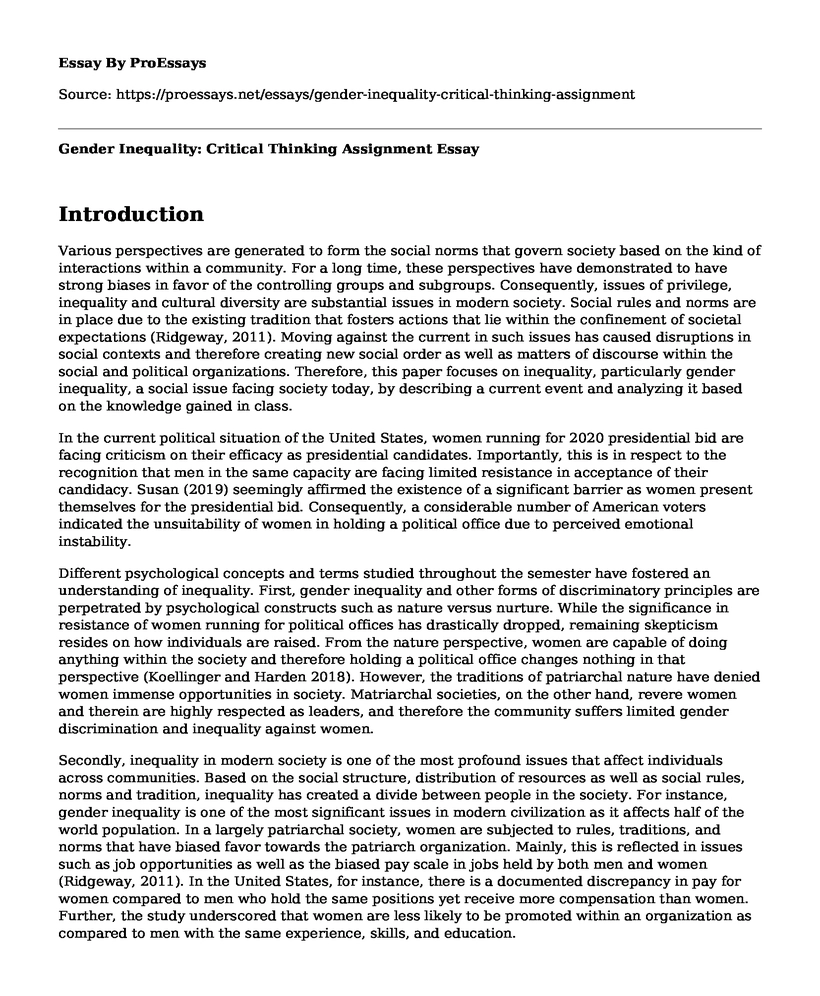Introduction
Various perspectives are generated to form the social norms that govern society based on the kind of interactions within a community. For a long time, these perspectives have demonstrated to have strong biases in favor of the controlling groups and subgroups. Consequently, issues of privilege, inequality and cultural diversity are substantial issues in modern society. Social rules and norms are in place due to the existing tradition that fosters actions that lie within the confinement of societal expectations (Ridgeway, 2011). Moving against the current in such issues has caused disruptions in social contexts and therefore creating new social order as well as matters of discourse within the social and political organizations. Therefore, this paper focuses on inequality, particularly gender inequality, a social issue facing society today, by describing a current event and analyzing it based on the knowledge gained in class.
In the current political situation of the United States, women running for 2020 presidential bid are facing criticism on their efficacy as presidential candidates. Importantly, this is in respect to the recognition that men in the same capacity are facing limited resistance in acceptance of their candidacy. Susan (2019) seemingly affirmed the existence of a significant barrier as women present themselves for the presidential bid. Consequently, a considerable number of American voters indicated the unsuitability of women in holding a political office due to perceived emotional instability.
Different psychological concepts and terms studied throughout the semester have fostered an understanding of inequality. First, gender inequality and other forms of discriminatory principles are perpetrated by psychological constructs such as nature versus nurture. While the significance in resistance of women running for political offices has drastically dropped, remaining skepticism resides on how individuals are raised. From the nature perspective, women are capable of doing anything within the society and therefore holding a political office changes nothing in that perspective (Koellinger and Harden 2018). However, the traditions of patriarchal nature have denied women immense opportunities in society. Matriarchal societies, on the other hand, revere women and therein are highly respected as leaders, and therefore the community suffers limited gender discrimination and inequality against women.
Secondly, inequality in modern society is one of the most profound issues that affect individuals across communities. Based on the social structure, distribution of resources as well as social rules, norms and tradition, inequality has created a divide between people in the society. For instance, gender inequality is one of the most significant issues in modern civilization as it affects half of the world population. In a largely patriarchal society, women are subjected to rules, traditions, and norms that have biased favor towards the patriarch organization. Mainly, this is reflected in issues such as job opportunities as well as the biased pay scale in jobs held by both men and women (Ridgeway, 2011). In the United States, for instance, there is a documented discrepancy in pay for women compared to men who hold the same positions yet receive more compensation than women. Further, the study underscored that women are less likely to be promoted within an organization as compared to men with the same experience, skills, and education.
The materials studied in class have created enlightenment and fostered an appreciation of the diversity of human experiences. In a world of perceived gender equality, most women tend to face inequality in a variety of ways based on culture and social perceptions. The study on diversities of human experiences has been essential in enabling the understanding of gender inequality and other discriminatory practices against the females hence showing the need for practical and applicable solutions.
Conclusion
In summation, gender inequality has been accelerated by the perspectives that exist within society. The stigma associated with gender equality can be contextualized in the nurture of people based on dated concepts of traditions and norms. While society has its limits within its comprehension of the modernized world, inequality influences how the world works.
References
Koellinger, P., & Harden, K. (2018). Using nature to understand nurture. Science, 359(6374), 386-387. doi: 10.1126/science.aar6429
Ridgeway, C. L. (2011). Framed by gender: How gender inequality persists in the modern world. New York, NY: Oxford University Press.
Susan, M. (2019). Women Candidates Still Tagged as Too 'Emotional' to Hold Office. Retrieved from https://www.usnews.com/news/politics/articles/2019-04-16/women-candidates-still-tagged-as-too-emotional-to-hold-office
Cite this page
Gender Inequality: Critical Thinking Assignment. (2022, Mar 10). Retrieved from https://proessays.net/essays/gender-inequality-critical-thinking-assignment
If you are the original author of this essay and no longer wish to have it published on the ProEssays website, please click below to request its removal:
- Failing Entrance Exam Essay
- High Pressured Situations and Leadership Paper Example
- Major Disorder and Obesity Paper Example
- Women's Access to Abortion Services - Essay Sample
- Essay Sample on Pedagogy in Arabic Class
- Growing up Without Cultural Values: A Child's Perspective - Essay Sample
- Research Paper on Global Cities Re-Imagine Labour, Capital and Inequality Challenges







